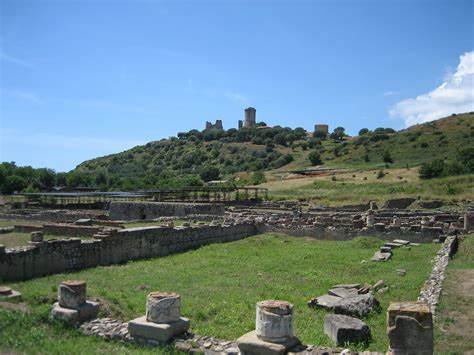
The Eleatic School: 10 Surprising Facts
Share

1. Mixed Origins and Controversial Founders of the Eleatic School
The Eleatic School, a significant pre-Socratic philosophical movement with a profound impact on Western thought, emerged in the city of Elea (now Ascea in the province of Salerno), a vital center in Magna Graecia on the Cilento coast, today called Velia, south of Paestum. This philosophical school, with roots in an intensely intellectual context, is debated regarding its founding. Although often attributed to Xenophanes of Colophon, there are convincing arguments that suggest Parmenides of Elea as the true founder. This debate heightens historical and philosophical interest in the Eleatic School, whose influence has been crucial in the development of Western philosophy.
2. The Unique Approach of the Eleatics to Philosophy
Unlike their contemporaries, the Eleatics rejected the doctrine of sensism of the Milesian School and investigated the existence of a single, immutable, and eternal being. This new philosophical paradigm emphasized rational and logical thought, laying the groundwork for understanding being and appearance.
3. Parmenides: The Father of Ontology
Parmenides of Elea, considered the inventor of dialectics and the father of ontology, revolutionized philosophy with his work "On Nature." His view of being as a static and unchanging reality broke with previous traditions, opening new horizons in philosophical thought.
4. Zeno and His Paradoxes
Zeno of Elea, known for his paradoxes, used dialectics to defend Parmenides' theories. His paradoxes, particularly that of Achilles and the Tortoise, challenged traditional understanding of movement and reality.
5. The Lasting Influence of Eleatic Philosophy
Despite initial opposition, the Eleatic School profoundly influenced philosophical thought, from Gorgias to Plato, and continues to inspire modern philosophy. Their contribution to logic and dialectics was fundamental to the development of Western philosophy.
6. Einstein and the Paradox of Achilles and the Tortoise: A Bridge between Philosophy and Physics
The relevance of the Eleatic School extends well beyond philosophy. Zeno's paradox of Achilles and the Tortoise has influenced thinkers in theoretical physics, including giants like Albert Einstein. His theory of relativity, a milestone in the history of physics, finds inspiration in these philosophical reflections, demonstrating a surprising interconnection between ancient philosophical inquiries and modern scientific discoveries. The city of Elea, significant for the Eleatic School, was also honored in the world of technology: Adriano Olivetti named a series of innovative supercomputers "Elea," including the Elea 9003, which marked a turning point in computing history as the first commercial supercomputer built entirely with transistors.
7. The Technological Legacy of the Eleatic School
The Eleatic School influenced not only philosophy and physics but also the field of modern technology. Adriano Olivetti, an Italian pioneer in computing, paid homage to Elea, the cradle of the Eleatic School, by naming a series of advanced supercomputers. The Elea 9003 model, in particular, represents a crucial moment in technology history as the first commercial supercomputer built entirely with transistors. This connection between ancient philosophy and modern technology highlights the cross-disciplinary impact of philosophical ideas and concepts on various fields of human knowledge.
8. Melissus of Samos and the Extension of Eleatic Ideas
Melissus of Samos, another philosopher of the Eleatic School, expanded on the theories of Parmenides and Zeno. In contrast to Heraclitus, who saw the world as constantly changing, Melissus maintained that reality is a single unchanging entity. His conception of the universe as infinite and indivisible made a significant contribution to Parmenidean thought, reinforcing the idea of the unity of being.
9. The Milesian School and the Contrast with the Eleatics
The Eleatic School had a direct confrontation with the ideas of the early natural philosophers of the Milesian School. While the latter emphasized the importance of sensory experience and pluralism in understanding reality, the Eleatics, led by figures like Parmenides and Zeno, proposed a more abstract and logical approach, focusing on the unity and immobility of being.
10. The Legacy of Xenophanes and Its Impact on the Eleatic School
Xenophanes of Colophon, often associated with the Eleatic School, made significant contributions to its development. His critical reflections on divinity and religious tradition provided a foundation for subsequent Eleatic philosophical inquiry, which departed from traditional conceptions to embrace a more rational and ontological approach to reality.
What is the Eleatic School?
A: The Eleatic School is a philosophical school founded in the 5th century BCE in Velia by Parmenides of Elea and Zeno of Elea. It is known for its theories about being and non-being.
Who are the main philosophers associated with the Eleatic School?
A: The main philosophers associated with the Eleatic School are Parmenides of Elea and Zeno of Elea, who are considered the founders of this philosophical movement.
What is the contribution of Zeno and Melissus to the Eleatic School?
A: Zeno and Melissus were important figures in the Eleatic School and contributed to the theory of being and non-being according to Parmenides.
Where does the name of the Eleatic School come from?
A: The Eleatic School takes its name from Elea, a city in Magna Graecia where it was founded by Parmenides and Zeno.
What is the main theory of Parmenides of Elea?
A: The main theory of Parmenides of Elea is that being is, and it cannot not be, opposing the theory of non-being proposed by Heraclitus.
What was the main goal of the Eleatic School?
A: The main goal of the Eleatic School was to formulate a metaphysical theory that demonstrated that being is and cannot not be.
What is the relationship between the Eleatic School and the pre-Socratic philosophers?
A: The Eleatic School is associated with the pre-Socratic philosophers, particularly for its theory on being, which opposed the multiple and changing view proposed by philosophers like Heraclitus.
What was the Eleatic School's position on the nature of non-being?
A: According to Parmenides and the Eleatic School, non-being cannot exist, and therefore being is the only existing reality, in contrast to Heraclitus' theory of continuous change and non-being.
What was the historical context in which the Eleatic School developed?
A: The Eleatic School developed in the context of Magna Graecia, in the 5th century BCE, particularly in the city of Elea, in Lucania.
What are the testimonies about the Eleatic School?
A: The testimonies about the Eleatic School are indirect and are based on later historians and philosophers who cited and interpreted the theories of Parmenides and Zeno.


